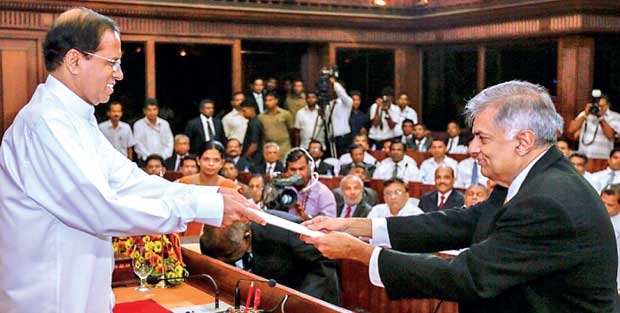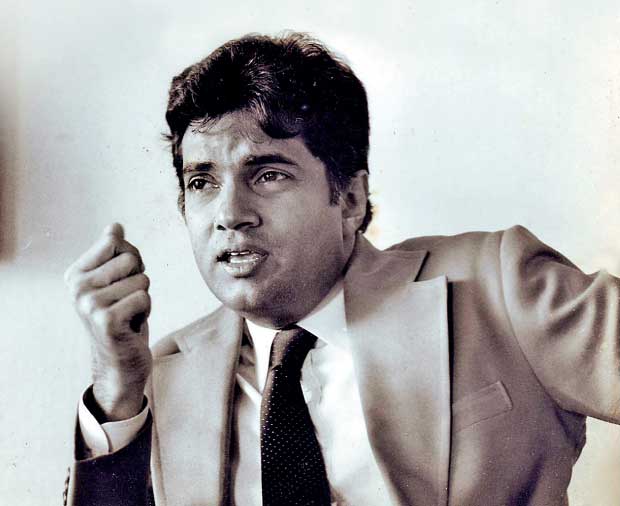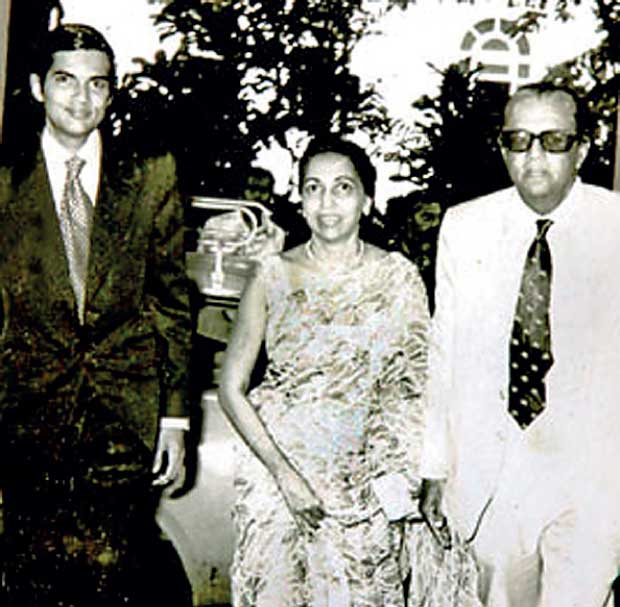Reply To:
Name - Reply Comment
 Ranil Wickremesinghe taking oath as Prime Minister
Ranil Wickremesinghe taking oath as Prime Minister
A benevolent leadership is essentially a victory for the common man. Rulers of the past accomplished farsighted schemes for the welfare and survival of future generations. Today, a rare opportunity has arisen for us to appreciate and congratulate Prime Minister Ranil Wickremesinghe for the unique services he has rendered to the nation during the past 40 years as a Member of Parliament.
His political career has been studded with key ministries in addition to being Leader of the House as well as Leader of the Opposition. At present, the 68-year-old Ranil is at the apex of Sri Lanka politics and will go down in history as having held the office of Prime Minister of Sri Lanka on four occasions. He is recognized as an iconic political leader by global democratic strongmen. It’s indeed phenomenal how this remarkably reserved person managed to win the confidence of people to drive his party to the political vanguard of our nation.
Born on 24th March 1949, Ranil probably inherited his sterling qualities from his parents and forefathers. He is the second son of Esmond and Nalini Wickremesinghe and has three brothers, Shan (Chairman TNL), Niraj, Channa and an only sister Kshanika.
The late Esmond Wickremesinghe was an internationally renowned media champion. His mother was the eldest daughter of National Patriot D.R. Wijewardene, the ‘Father of Print Media’ in Sri Lanka. When the national leader E.W. Perera, discovered the Royal Banner of our last King Sri Wickrema Rajasinghe disrespectfully hanging at the Chelsea Hospital in London; it was D.R. Wijewardene who helped him to bring it back to Sri Lanka. Ranil’s paternal grandfather C.E.L. Wickremesinghe was the first Sinhala Government Agent in 1930 and also the first Sri Lankan to become The Commissioner of Lands.
When Ranil was making efforts to solve the social and economic problems donor countries were convinced of Ranil’s democratic policies
 Ranil’s family has been among the Chief Dayakaya’s of the Kelaniya Temple. Ranil became well-versed in the Buddha Dhamma and national history due to his mother’s influence and also by constantly associating with the learned Bikkhus of the Gangaramaya Viharaya, Hunupitiya.
Ranil’s family has been among the Chief Dayakaya’s of the Kelaniya Temple. Ranil became well-versed in the Buddha Dhamma and national history due to his mother’s influence and also by constantly associating with the learned Bikkhus of the Gangaramaya Viharaya, Hunupitiya.
He attended Royal College Colombo and entered the Law Faculty of the Colombo University. In 1972, he took oaths as an Advocate of the Supreme Court of Sri Lanka. Ranil held the distinction of being the first and only product of a Ceylon University to become the Prime Minister of our country.
When draconian laws were implemented and the democratic freedom of the country was threatened, Ranil’s Uncle, the then leader of the United National Party and Leader of the Opposition, J.R. Jayewardene, introduced young Ranil to politics as the UNP Organizer for the Kelaniya Electorate in the 1970’s.
At the 1977 General Election, Ranil contested the Biyagama Seat and entered Parliament as its youngest M.P. He was first appointed Deputy Foreign Minister in the J.R. Jayewardene Government. Later, he was sworn in as Cabinet Minister of Youth Affairs and Employment. Ranil was instrumental in setting up the Sri Lanka National Guard and the National Youth Service Council and Bellwood Village which provided new avenues and vocational training for school leavers.
As the Minister of Education, Ranil took several measures to stop political appointments of teachers. He founded the National Institute of Education, established Colleges of Education for Teachers and simultaneously took action to upgrade Pirivena Education. He streamlined the distribution of free school text books and introduced other schemes beneficial to education.

At the 1989 General Election, Ranil was once again elected to Parliament and appointed Minister of Industries by President Ranasinghe Premadasa. Subsequently, he became Minister of Science and Technology; establishing the Biyagama Special Economic Zone as another major milestone in his career.
The General Election held during Chandrika Bandaranaike Kumaratunga’s rule in 2000, saw the defeat of the UNP. However, Ranil succeeded in toppling her People’s Alliance Government within a short period and, at the Parliamentary Elections held in 2001, Ranil steered his party to victory forming a UNP Government. On assuming the Premiership, he rescued the country from its financial crisis.
At that time, the country was in the throes of a war against terrorism. Though Ranil was criticized for his ceasefire pact with the LTTE in support of his peace program, the U.S.A. granted a $45 Billion loan to Sri Lanka at that time. When Ranil was making decisive efforts to solve the social and economic problems of the country, donor countries were convinced of Ranil’s democratic policies. He was clearly on track toward an impressive economic recovery.
Ranil’s marriage with Maithree took place in 1995.
Ranil Wickremesinghe was a candidate at both presidential polls held in 1999 and 2005. Chandrika Kumaratunga defeated him in 1999 on the sympathy votes she received following the LTTE bomb attack on her. Similarly, Mahinda Rajapaksa won the presidential election held in 2005 by an extremely narrow margin. This was due to the support he got from the LTTE Leader Vellupillai Prabhakaran, who prevented over 700,000 Northern voters from exercising their free franchise.
In July 2002, after a lapse of almost 18 years, Premier Ranil met President George Bush at the White House. At that meeting, the US Government pledged to support Sri Lanka. Premier Ranil then went on to have meetings with British Prime Minister Tony Blair, Japanese Prime Minister Junichiro Koizumi and Indian Premier Atal Bhihari Vajpay.
As far back as 2003, Ranil proposed the creation of the Western Region Megapolis Project. Had it been launched at that time, the Meetotamulla garbage disaster wouldn’t have occurred. Sadly, while Prime Minister Ranil was holding discussions in USA, President Chandrika exercised her executive powers and dissolved Parliament. With JVP connivance the UNP lost the subsequent elections and Ranil became Leader of the Opposition.
By 2015, Sri Lanka remained almost isolated from the world. Mahinda Rajapakse’s regime had distanced Sri Lanka from the western world. As usual, Prime Minister Ranil Wickremesinghe, was compelled to shoulder a government with an empty Treasury and an enormous amount of foreign debts. Due to his indefatigable efforts, foreign investors were attracted to the country and friendly nations generously offered financial assistance to implement personal solutions for the farsighted vision of our Prime Minister.
As Leader of the Opposition, he proved his statesmanship prowess. Ranil was always a cooperative Opposition Leader to both Chandrika Bandaranaike and Mahinda Rajapakse Governments in helping them to carry out their national agendas. False propaganda was never in his league. Nevertheless, his rivals in some of the print and electronic media slandered him unjustifiably. Despite those dubious attempts, Ranil Wickremesinghe became the people’s choice and the candidate who polled the highest preferential votes amounting to 500,556 at the general elections held two years ago. It’s because of his statesmanship and integrity that he has been continuously elected to Parliament.
When the UNP Government lost the elections in 1994, Ranil vacated Temple Trees within hours and earned the well deserved ‘Mr. Clean.’ Additionally, Ranil was never power crazy. Being the UNP Leader, Ranil was the rightful aspirant for the Presidential Elections. Yet, on two occasions he gave up this opportunity. When General Sarath Fonseka contested, Ranil stepped back and supported him. Again he stepped down in support of the common candidate Maithripala Sirisena and contributed to the people’s victory on 8th January 2015.
In 2014, the Massachusetts Institute of Technology in recognition of Ranil’s activities named him as a Robert E. Wilhelm Fellow, while the International Democratic Union (IDU), enlisted him as a member of the IDU. During his recent visit to Australia, the Deakin University conferred an Honorary Doctorate on him in recognition of his significant contributions to the economy, education and human rights.
A few days ago, at a religious ceremony held at the Kotikawatte temple to mark his 40th anniversary and to bestow the blessing of the sacred ‘Thisarana’ on him, the Prime Minister expressing his heartfelt gratitude to the Maha Sangha said, “To have been in the House of Parliament and engaged in political activity for a long period of 40 years is no easy task. It’s an extremely tiresome job. You have to face both praise as well as blame. I never expected to have done this, but I have managed to do so. It was possible mostly because of my religious upbringing and what I have learned from the Buddhist philosophy. Especially by trying to practice the lessons taught in the sacred texts, such as the ‘Dhammapada.’
Mr. Prime Minister, may you go from strength to strength in your genuine endeavors to serve our Sri Lankan nation!